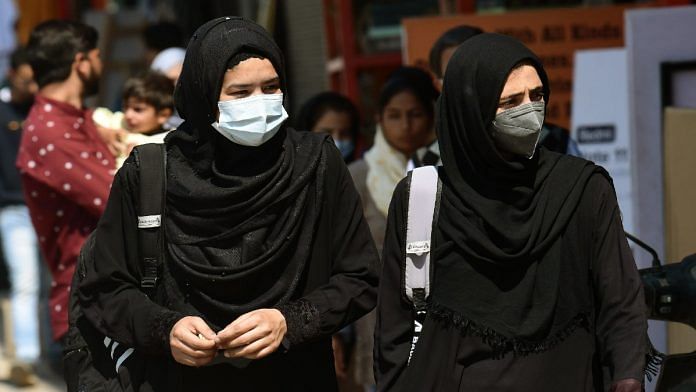New Delhi: The Karnataka government Tuesday cited ongoing anti-hijab protests by women in Iran to assert in the Supreme Court that the wearing of the headscarf is not an essential religious practice in Islam.
Representing the state, Solicitor General Tushar Mehta spoke of the demonstrations in the West Asian country to argue the Karnataka government’s stand that the prohibition on wearing the hijab in pre-university colleges in the state was not unconstitutional and did not violate anybody’s right to speech or privacy.
The protests in Iran were triggered by the death of a 22-year-old woman allegedly after she was detained by the ‘morality police’ for not wearing the hijab properly. Mahsa Amini, died in hospital on 16 September, three days after she was arrested and reportedly beaten up by the police in Tehran.
Solicitor general Mehta Tuesday commenced arguments before a bench of Justices Hemant Gupta and Sudhanshu Dhulia, which is hearing a batch of petitions against the Karnataka High Court’s March verdict that found no infirmity in the state government’s February order, which essentially banned the wearing of hijabs in pre-university colleges.
The restriction imposed by one such college in Udupi district of the state had sparked protests by students, who insisted on wearing the headscarf and attending classes. The situation escalated when the college said it would not allow female students donning hijabs to sit for internal exams. This led to filing of several petitions in the HC demanding that the government order be quashed.
In its interim order, the HC declined to accept the petitioners’ stand that the hijab was an essential religious practice, prompting them to approach the top court in appeal.
The petitioners, who concluded their arguments Tuesday, challenged the HC verdict on several grounds, and asserted that all religious practices and not just essential ones should be protected. It was also argued that the right to dress is part of the right to live with dignity under Article 21 of the Constitution, which also includes the right to privacy.
Also read: Reform on hijab important but where it’s coming from is more important
‘May be permissible or ideal practice, but not essential’
Mehta began his submission by claiming that students who participated in the protests against the hijab ban were influenced by the radical outfit Popular Front of India (PFI).
“This is not a spontaneous act of a few individual children who want to wear a hijab. They were part of a planned conspiracy. These children are acting as advised by PFI,” he said.
Later, he added that there are constitutionally Islamic countries where women were fighting against the hijab. On being asked which one, Mehta mentioned Iran.
“So, it is not an essential religious practice. A mention in the Quran will not make it essential, it may be a permissible or ideal practice, but not essential,” the solicitor general maintained.
He further argued that the HC could have avoided going into the question of whether the hijab is an essential religious practice but addressed the issue only because the petitioners had raised it.
Mehta further contended that even protection of essential religious practice was not absolute under the Constitution and was subject to certain restrictions, such as whether the practice affected public morality, the country’s security and law and order.
To explain himself, Mehta gave an “extreme example” of “someone” who insists on “drinking and dancing nude in public”.
“Somebody will say it will be against morality. I may be prevented by local authorities (from drinking and dancing in public). So, who will decide?” he asked.
However, the bench did not find the “extreme example” appropriate. Mehta went on to elaborate the concept of essential religious practice to argue how wearing the hijab did not get bracketed in this category.
“Maybe the Holy Quran says so. I accept it. But when they assert that right before the Court of Law, merely a mention in the Quran will not by itself make it an essential religious practice, it may become a religious practice. They have to show it (practice) is so compelling. We have figures to show that nobody has been excommunicated for not following it (wearing the hijab),” Mehta said.
“It can be a permissible practice or at best an ideal practice but not an essential practice,” he added.
‘It was a religion-neutral direction’
Later, addressing the petitioners’ argument that wearing of the hijab is part of their right to free speech and expression, Mehta said the government order empowering pre-university colleges to prescribe a uniform was to make sure there was no disparity among students. It was intended to ban all religious clothing and did not make an exception for the hijab.
“It was a religion-neutral direction, to ensure unity is not disturbed. Unity is the soul of the Constitution,” Mehta said. According to him, every institution, including educational ones, needs to maintain discipline.
“Discipline cannot depend upon the institution. Discipline expected from me as a member of the bar is the same as the discipline expected from a student or doctor as far as uniform is concerned. Level of punishment may differ, but the threshold doesn’t change,” Mehta submitted.
He reiterated that the prescription of uniform did not infringe any harm on anyone and was meant for uniformity.
(Edited by Nida Fatima Siddiqui)
Also read: Popular Front of India — radical outfit with ‘SIMI links’ now under CAA protests scanner



